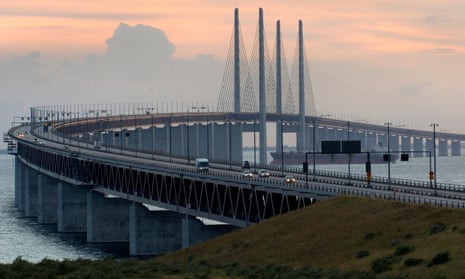Sweden is introducing border checks for the first time since the start of the refugee crisis, hours after its prime minister asked European counterparts at a high-level migration conference in Malta to do more to help his country and Germany care for refugees arriving on the continent.
Swedish police will monitor trains and ferries arriving from mainland Europe and stop anyone without valid travel documents. Officials stressed that anyone seeking to apply for asylum in Sweden would not be turned back, and said the intention is to deter those hoping to cross Sweden to reach other Scandinavian countries, and to create a more orderly process of arrival for refugees.
“If they come to the border and request asylum, then we will process their request, but if they have no desire to stay, then that’s a question for the police,” a spokeswoman for Sweden’s migration agency, Migrationsverket, said.
Under the previous system, refugees could simply take the train or ferry to Sweden and enter the country unobstructed – a laissez-faire situation that its prime minister now says constitutes a threat to security. In an interview with BBC Radio 4’s Today programme on Thursday, Stefan Löfven said: “If you don’t have good control of who is coming here – what people are actually entering the county – that is a risk.”
Sweden is proportionally bearing the biggest burden of the European migration crisis, with 10,000 asylum-seekers arriving every week, and no more short-term space to house them. Migration officials expect the country to absorb at least 170,000 asylum seekers by the end of the year, within a total population of 10 million. Britain, with a population of more than 60 million, has pledged to receive 4,000 Syrian refugees in the same period.
Löfven said other EU countries needed to step up their response to the refugee crisis, so that the burden was not only left to Sweden and Germany. “I’ve been mentioning burden sharing for a long time,” Löfven told Today. “It is not sustainable that one country, or two countries, take the vast part of the responsibility. All European countries need to take responsibility. If the European Union can’t handle this situation, it’s serious.”
Other European countries have been extremely slow to react to the scale of the crisis. EU leaders have convened several conferences, such as Thursday’s gathering in Malta, but little has been achieved at them. Politicians took months to agree to even a modest quota system that would see less than a quarter of refugee arrivals shared between the EU’s members, leaving the majority of the burden to countries like Sweden and Germany.
On Thursday, the deputy head of the EU border agency Frontex said EU countries had failed to provide it with the resources and personnel it needed to deal with the record influx of migrants entering the EU.
“Up until now, member states have only committed 40% of the resources we asked for,” Gil Arias told Spanish daily El Mundo. In October the agency turned to the European commission, formally requesting more personnel for operations in Greece and the Balkans, but received little response, he said.
The lack of resources, said Arias, has left Frontex in a tricky situation. “Often enormous expectations are generated over what the agency can do,” he said, noting that the agency had unofficially shifted its mandate in recent months from patrolling EU coastlines to carrying out daily rescues of migrants. “Frontex was not created to replace member states when it comes to rescue and border patrol, but rather to help them.”
The burden on Sweden has left the country struggling to find enough beds for its new residents, and has led to internal division about its asylum policies. The far-right Swedish Democrat party has called for the country to end its generosity, while the government argues that its high humanitarian standards should be maintained at all costs, and blames its domestic crisis on the negligence of other countries.
“The big problem is in Europe,” Fredrik Bengtsson, spokesman for Migrationsverket, said. “There are so many different asylum systems. In Sweden we have one system, in Hungary they have another, so of course [refugees] are making the rational decision about where they want to go.
“The key for this question is not for Sweden to lower their standards, it’s for other people to raise theirs.”

Comments (…)
Sign in or create your Guardian account to join the discussion